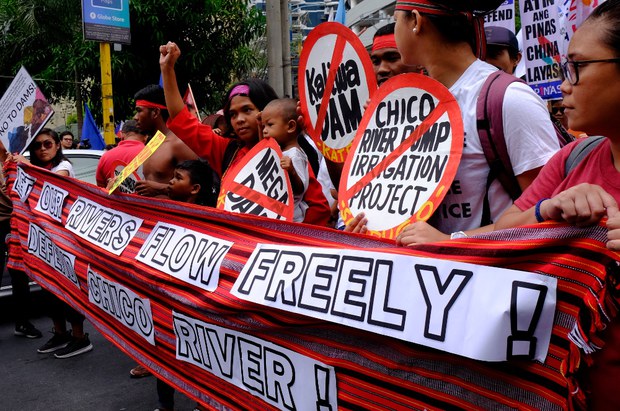Philippines Tops List of Deadliest Countries for Environmental Defenders
2019.07.30
Manila
 Members of a tribal group join a protest in Manila to call attention to a major dam project in the northern Philippines that was expected to displace hundreds of families, April 9, 2019.
Members of a tribal group join a protest in Manila to call attention to a major dam project in the northern Philippines that was expected to displace hundreds of families, April 9, 2019.
With 30 recorded killings, the Philippines emerged in 2018 as the world’s deadliest country for land rights activists, farmers and environmental defenders, a London-based human rights advocacy group said Tuesday.
The Philippines claimed the title even as it saw the number of killings decrease from 48 in 2017, which Global Witness (GW) described at the time as the most ever recorded in one year in an Asian nation.
“For the first time since Global Witness began documenting such killings, the Philippines recorded the highest death toll globally, with 30 victims,” GW said in its latest report.
GW noted an incident in October 2018 when gunmen shot and killed nine sugarcane farmers, including women and teenagers, who were at the center of a longstanding dispute on the central Philippine island of Negros. The next month, hitmen killed the lawyer who represented the victims’ families, Benjamin Ramos.
GW’s report shows that across the globe, more than three land or environmental defenders were killed on average each week after protesting mining and logging activities, agribusiness, or hydropower projects. Mining was linked to 43 of the total 164 deaths in 19 countries surveyed.
The 52-page report said that “state intimidation” of defenders had continued into 2019.
“President Rodrigo Duterte’s government has ramped up its campaign of ‘red-tagging’ rights activists, including land and environmental defenders, as communist sympathizers, terrorists or supporters of a group of armed insurgents,” the report said, referring to the practice of lumping ordinary activists with communist rebels who have been waging an insurgency since 1969.
“In March 2018, the Philippines government declared me a terrorist. This was in retaliation for me speaking out against indigenous rights violations in my home country,” said Victoria Tauli-Corpuz, United Nations special rapporteur on the rights of indigenous people.
“For months, I lived under threat, and could not safely return home. Although I have since been removed from the list, government officials continue to hurl false accusations at me,” Tauli-Corpuz said.
Previously, Tauli-Corpuz was tagged by the Philippine government as a communist rebel because of her long-time advocacy work but her name was removed from that list in January.
Rivalries blamed
Duterte spokesman Salvador Panelo blamed the reported killings on rivalries among claimants of properties, but did not explain how he had reached this conclusion.
“Well, that happens. If there are conflicts among claimants of a particular land, killings occur because of the viciousness of the rivalry between claimants,” Panelo told reporters.
Following the killing of the nine farmers in October, the National Federation of Sugar Workers alleged the shooters were hired by plantation owners to get them off the land. NFSW officer Danilo Tabora confirmed that about 75 members of the union had occupied the land as part of a campaign to till lands covered by the Philippine government’s agrarian reform program.
“Let me tell you that the government will always be concerned with respect to any violence inflicted against the citizens of this country, whether done by outside forces or by those inside this country,” Panelo said.
GW senior campaigner Alice Harrison said attacks against land and environmental defenders continue, despite growing support for environmental movements.
“As we hurtle toward climate breakdown, it has never been more important to stand with those who are trying to defend their land and our planet against the reckless destruction being meted out by the rich and powerful,” Harrison said in a statement.
“It is a brutal irony that while judicial systems routinely allow the killers of defenders to walk free, they are also being used to brand the activists themselves as terrorists, spies or dangerous criminals. Both tactics send a clear message to other activists: the stakes for defending their rights are punishingly high for them, their families and their communities,” she said.
Jeoffrey Maitem in Cotabato, Philippines, contributed to this report.







